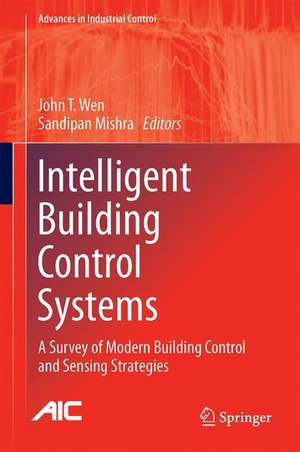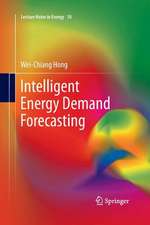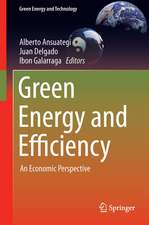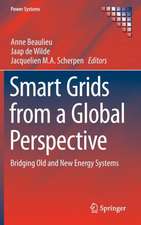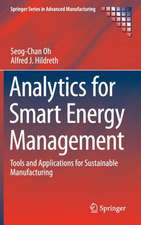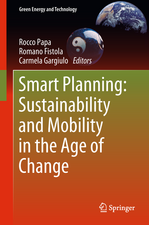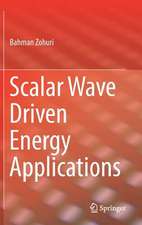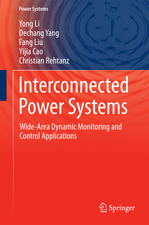Intelligent Building Control Systems: A Survey of Modern Building Control and Sensing Strategies: Advances in Industrial Control
Editat de John T. Wen, Sandipan Mishraen Limba Engleză Hardback – 13 dec 2017
- model-based and model-free control design for temperature control;
- smart lighting systems;
- smart sensors and actuators (such as smart thermostats, lighting fixtures and HVAC equipment with embedded intelligence); and
- energy management, including consideration of grid connectivity and distributed intelligence.
| Toate formatele și edițiile | Preț | Express |
|---|---|---|
| Paperback (1) | 635.06 lei 38-44 zile | |
| Springer International Publishing – sep 2018 | 635.06 lei 38-44 zile | |
| Hardback (1) | 902.20 lei 38-44 zile | |
| Springer International Publishing – 13 dec 2017 | 902.20 lei 38-44 zile |
Din seria Advances in Industrial Control
- 15%
 Preț: 643.34 lei
Preț: 643.34 lei - 23%
 Preț: 582.63 lei
Preț: 582.63 lei - 18%
 Preț: 783.98 lei
Preț: 783.98 lei - 18%
 Preț: 947.35 lei
Preț: 947.35 lei - 20%
 Preț: 568.24 lei
Preț: 568.24 lei - 15%
 Preț: 643.16 lei
Preț: 643.16 lei - 18%
 Preț: 899.21 lei
Preț: 899.21 lei - 18%
 Preț: 891.33 lei
Preț: 891.33 lei - 18%
 Preț: 740.57 lei
Preț: 740.57 lei - 18%
 Preț: 961.23 lei
Preț: 961.23 lei - 18%
 Preț: 955.08 lei
Preț: 955.08 lei - 15%
 Preț: 645.28 lei
Preț: 645.28 lei - 15%
 Preț: 638.43 lei
Preț: 638.43 lei - 18%
 Preț: 901.11 lei
Preț: 901.11 lei - 18%
 Preț: 1410.94 lei
Preț: 1410.94 lei - 18%
 Preț: 728.91 lei
Preț: 728.91 lei - 20%
 Preț: 1003.78 lei
Preț: 1003.78 lei - 18%
 Preț: 947.35 lei
Preț: 947.35 lei - 15%
 Preț: 643.34 lei
Preț: 643.34 lei - 15%
 Preț: 654.30 lei
Preț: 654.30 lei - 18%
 Preț: 950.52 lei
Preț: 950.52 lei - 15%
 Preț: 644.30 lei
Preț: 644.30 lei - 18%
 Preț: 1393.09 lei
Preț: 1393.09 lei - 18%
 Preț: 950.21 lei
Preț: 950.21 lei - 18%
 Preț: 949.90 lei
Preț: 949.90 lei - 18%
 Preț: 949.42 lei
Preț: 949.42 lei - 18%
 Preț: 950.52 lei
Preț: 950.52 lei - 18%
 Preț: 1113.71 lei
Preț: 1113.71 lei - 15%
 Preț: 650.04 lei
Preț: 650.04 lei - 15%
 Preț: 644.95 lei
Preț: 644.95 lei - 18%
 Preț: 950.33 lei
Preț: 950.33 lei - 18%
 Preț: 948.61 lei
Preț: 948.61 lei - 18%
 Preț: 1112.60 lei
Preț: 1112.60 lei - 15%
 Preț: 644.63 lei
Preț: 644.63 lei - 18%
 Preț: 953.20 lei
Preț: 953.20 lei - 18%
 Preț: 945.62 lei
Preț: 945.62 lei - 15%
 Preț: 640.88 lei
Preț: 640.88 lei - 15%
 Preț: 640.88 lei
Preț: 640.88 lei - 20%
 Preț: 650.92 lei
Preț: 650.92 lei - 18%
 Preț: 1112.60 lei
Preț: 1112.60 lei - 20%
 Preț: 998.36 lei
Preț: 998.36 lei - 15%
 Preț: 643.34 lei
Preț: 643.34 lei - 18%
 Preț: 948.92 lei
Preț: 948.92 lei - 18%
 Preț: 1381.43 lei
Preț: 1381.43 lei - 15%
 Preț: 651.51 lei
Preț: 651.51 lei - 15%
 Preț: 647.08 lei
Preț: 647.08 lei - 20%
 Preț: 563.66 lei
Preț: 563.66 lei - 18%
 Preț: 992.64 lei
Preț: 992.64 lei - 18%
 Preț: 1225.79 lei
Preț: 1225.79 lei
Preț: 902.20 lei
Preț vechi: 1187.11 lei
-24% Nou
Puncte Express: 1353
Preț estimativ în valută:
172.66€ • 179.59$ • 142.54£
172.66€ • 179.59$ • 142.54£
Carte tipărită la comandă
Livrare economică 10-16 aprilie
Preluare comenzi: 021 569.72.76
Specificații
ISBN-13: 9783319684611
ISBN-10: 3319684612
Pagini: 313
Ilustrații: XXII, 313 p. 118 illus., 84 illus. in color.
Dimensiuni: 155 x 235 mm
Greutate: 0.7 kg
Ediția:1st ed. 2018
Editura: Springer International Publishing
Colecția Springer
Seria Advances in Industrial Control
Locul publicării:Cham, Switzerland
ISBN-10: 3319684612
Pagini: 313
Ilustrații: XXII, 313 p. 118 illus., 84 illus. in color.
Dimensiuni: 155 x 235 mm
Greutate: 0.7 kg
Ediția:1st ed. 2018
Editura: Springer International Publishing
Colecția Springer
Seria Advances in Industrial Control
Locul publicării:Cham, Switzerland
Cuprins
Introduction and Overview.- Part I: Building-Level Design and Control.- Architectures and Algorithms for Building Control and Optimization: An Industry View.- Operating Systems for Small/Medium Commercial Buildings.- Part II: Heating, Ventilation, and Air-Conditioning (HVAC) Systems.- HVAC System Modeling and Control: Vapor Compression System Modeling and Control.- HVAC System Modeling and Control: Multi-Zone Temperature Modeling and Control.- Model Predictive Control for Forced Air and Radiant Slab Systems.- Constrained Model Predictive Control of HVAC Equipment.- Part III: Beyond HVAC: Lighting, Grid, and Distributed Intelligence.- Smart Lighting Control.- Stochastic Predictive Control Strategies for Building Energy Management Systems in a Smart Grid Scenario.- Controlling the Internet of Things: From Energy Saving to Fast Evacuation in Smart Buildings. Current and Future Directions.
Notă biografică
John T. Wen has extensive industrial and academic experience in control systems. He received his B.Eng. from McGill University, M.S. from University of Illinois, Ph.D. from Rensselaer Polytechnic Institute, all in Electrical Engineering. He worked at Fisher Controls and Jet Propulsion Laboratory before joining Rensselaer Polytechnic Institute in 1988. He is now a Professor in the Electrical, Computer, and Systems Engineering. He was the Director of the Center for Automation Technologies and Systems (CATS) from 2005-2013, and has been the Head of the Industrial and Systems Engineering since 2013. He was awarded the 2013 IEEE Control Systems Society Transition to Practice Award based on the co-invention of the Adaptive Scanning Optical Microscope (ASOM), which was licensed to Thorlabs. His research interest lies in the modeling and control of dynamical systems with applications to motion control, robot manipulation, opto-mechatronics, thermal management, and active flow control. He isa Fellow of the IEEE.
Sandipan Mishra received his B.Tech. in Mechanical Engineering from the Indian Institute of Technology Madras in 2002 and his Ph.D. in Mechanical Engineering from the University of California at Berkeley in 2008. Dr. Mishra joined Rensselaer Polytechnic Institute as a faculty in the Mechanical, Aerospace, and Nuclear Engineering Department in Fall 2010. He is the recipient of the NSF Early CAREER award in 2013 on additive manufacturing and was a member of the 2010 Japan NXT-NSF Young investigator exchange program for nanomanufacturing. His research interests are in the area of systems and control theory, learning control, nonlinear estimation, and precision mechatronics, as applied to smart building systems, additive manufacturing, and adaptive optics.
Sandipan Mishra received his B.Tech. in Mechanical Engineering from the Indian Institute of Technology Madras in 2002 and his Ph.D. in Mechanical Engineering from the University of California at Berkeley in 2008. Dr. Mishra joined Rensselaer Polytechnic Institute as a faculty in the Mechanical, Aerospace, and Nuclear Engineering Department in Fall 2010. He is the recipient of the NSF Early CAREER award in 2013 on additive manufacturing and was a member of the 2010 Japan NXT-NSF Young investigator exchange program for nanomanufacturing. His research interests are in the area of systems and control theory, learning control, nonlinear estimation, and precision mechatronics, as applied to smart building systems, additive manufacturing, and adaptive optics.
Textul de pe ultima copertă
Readers of this book will be shown how, with the adoption of ubiquituous sensing, extensive data-gathering and forecasting, and building-embedded advanced actuation, intelligent building systems with the ability to respond to occupant preferences in a safe and energy-efficient manner are becoming a reality. The articles collected present a holistic perspective on the state of the art and current research directions in building automation, advanced sensing and control, including:
- model-based and model-free control design for temperature control;
- smart lighting systems;
- smart sensors and actuators (such as smart thermostats, lighting fixtures and HVAC equipment with embedded intelligence); and
- energy management, including consideration of grid connectivity and distributed intelligence.
Caracteristici
Provides a comprehensive perspective of the present and likely future of building automation and control Broadens understanding of building control and energy systems with a collection of coordinated articles from well-known researchers in academe, national research laboratories and industrial research divisions Considers thermal, illumination, distributed communication and control, and grid-connecitivity issues Practitioners will benefit from case studies and to-scale implementations Includes supplementary material: sn.pub/extras
